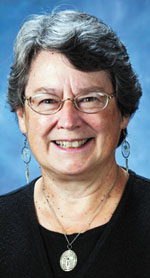By Corrine Winter
I recently caught a segment on television on the topic of “mindfulness.” A reporter was shown at a workshop on meditation aimed at setting aside the plans and stresses that tend to clutter our minds in order to be present to what he was doing at the moment. Before the session, each participant had to shut off her/his cell phone, tablet or any other electronic device and put it into a basket that was passed around the way in which a collection basket is passed in church. The instructor then led the students through exercises that involved concentrating on their breathing, sitting, walking, even eating (in silence) and setting aside any other thought that entered their minds. Neither the reporter nor any of those he interviewed made any mention of faith, religion or prayer, but I am sure I am not the only one who was reminded of various spiritual exercises or at least of ways in which we prepare for meditative prayer.

The mindfulness instructor and a number of prominent business people who are convinced of the value of his methods spoke of decreased stress and increased productivity as key benefits. They agreed that our tendency to be constantly connected through phone, Internet, etc., leads in the opposite direction, to constant distraction and inefficiency. They did mention the holiday season, citing it as a time when we might be especially caught up in thinking ahead and stressed about all the extra things we try to get done. They proposed that the practice of mindfulness — of being present to what we are doing in the moment — could lead to a more enjoyable time.
It seems to me that the celebration of the Incarnation of the Son of God calls us to a particular kind of mindfulness. Throughout Advent we have been hearing the calls of the prophets. We often have a tendency as Christians to think of the prophets as foretelling the future — in particular, of foretelling the birth of Christ. But Scripture scholars tell us they were mostly calling the people of Israel to attend to the call of their own covenant relationship with their God — to care for the poor, to be faithful in worship, to avoid temptations around them. These are calls we can apply to our own lives even if the particular needs, ways of worship and temptations look somewhat different on the surface. And as we celebrate the birth of Christ, we find new meanings in the prophetic texts in the light of our understanding of this event as well as in the light of our current experiences.
The other temptation that we Christians often face as we celebrate Christmas is to think of it primarily as an event in the past — something that happened once upon a time, and how wonderful it might have been to witness it in person. For my part, I am not so sure I would have liked living at the time. But the Christmas accounts do seem to say a lot about people who paid attention to words, to announcements, to signs that something important was happening.
The Gospel of John tells us that “The Word was made flesh and made his dwelling among us, and we saw his glory… (Jn 1:14)”. That line was once read at the “Last Gospel” of every Mass and at least the first line of it was part of the Angelus that we were encouraged to pray in response to morning, noon and evening church bells. Each of these practices could serve as a daily reminder of the reality of the Incarnation, not just as an event in the past, but as a present reality. We are called to pay attention to our lives as a place where God meets us, calls us, loves us, challenges us.
Catholic Tradition, it seems to me, is rich in its recognition of the goodness and importance of daily life. We were always reminded of morning offering, evening prayers, meal prayers. Stories of the saints recall lives well lived on a daily basis. May the celebration of Christmas renew our appreciation of the blessings that mark our every day as the Incarnate Word lives among us.
(Corinne Winter is a professor of theology at St. Ambrose University in Davenport.)








